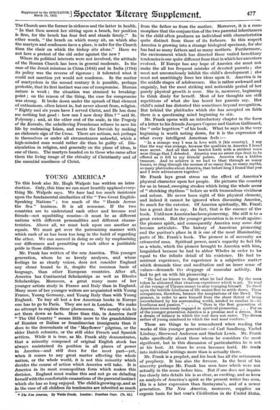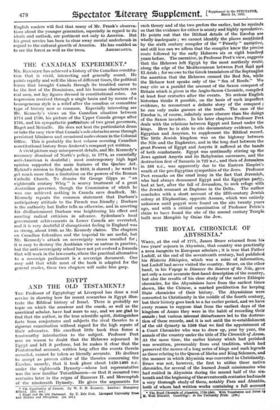YOUNG AMERICA.*
To this book also Mr. Hugh Walpole has written an intro duction: Only, this time we can most heartily applaud every- thing Mr. Walpole says. We have had too much insistence upon the fundamental similarities of the " Two Great English- Speaking Nations " ; too much of the " Hands Across the Sea " business. It is all nonsense. If the two countries are to understand each other and become real friends--not squabbling cousins—it must be as different nations with different personalities and different charac- teristics. Above all, we must look upon one another as equals. We must get over the patronizing manner with which each of us has been too long in the habit of regarding the other. We can succeed in doing so only by emphasizing our differences and permitting to each other a justifiable pride in those differences.
Mr. Frank has written of the new America. This younger generation, whom he so keenly analyses, and whose feelings he so clearly voices, does not consider England any closer bound to it, despite the common basis of In guage, than other European countries. After all, America has Continental Scholarships as well as Rhodes Scholarships. Moreover, a great many more of her younger artists study in France and Italy than in England. Many more of her younger writers are acquainted with Young France, Young Germany, and Young Italy than with Young England. To buy all but a few American books in Europe one has to go to Paris. They are not in London. We make no attempt to explain these phenomena. We merely wish to set them down as facts. More than this, in America itself " The Old Country " means little more to the grandchildren of Russian or Italian or Scandinavian immigrants than it does to the descendants of the ' Mayflower ' pilgrims, or the older Dutch colonists; or the still older French and Spanish settlers. While it is true, as Mr. Frank ably demonstrates, that a minority composed of original English stock has always maintained its position in all places of power in America—and still does for the most part—yet, when it comes to any great matter affecting the whole nation, or the whole world, it is not this minority which decides the course of action which America will take. It is America in its most cosmopolitan form which makes this decision. England must realize this and not go on deluding herself with the comfortable emanations of the parental instinct which she has so long enjoyed. The child is growing up, and as in the case of all children its tendencies are inherited as much -.1 The New America, By Waldo Frank, London; Jonathan Cape. I7a. ed.]
from the father as from the mother. Moreover, it is a com- monplace that the conjunction of the two parental inheritances in the child often produces° an individual with characteristics quite distinct from those of its forbears. In this respect America is growing into a strange biological specimen, for she has had so many fathers and so many mothers. Furthermore, the environment which has directed these varied hereditary tendencies is one quite different from that in which her ancestors evolved. If Europe has any hope of America she must not make the all too frequent mistake of devoted parents ; she must not unconsciously inhibit the child's development ; she must not unwittingly force her ideas upon it. America is in the middle stages of adolescence. She is rather awkward and ungainly, but the most striking and noticeable period of her purely physical growth is over. She is, moreover, beginning to think dimly for herself. Most of her thoughts are still repetitions of what she has heard her parents say. Her child's mind has distorted this sometimes beyond recognition. But behind the platitudes which she has accepted on faith there is a questioning mind beginning to stir.
Mr. Frank opens with an introductory chapter in the form of a letter to his friends Jacques Copeau and Gaston Gallimard, the " onlie begetters " of his book. What he says in the very beginning is worth noting down, for it is the expression of what every intelligent American feels :-
" In a strange way I was in love with it [his country]. I say that the way was strange, because the qualities in America I loved were secret. And all that she bawled forth with a strident voice were things that I detested. America was no sweet ripe fruit to be offered as it fell to my friends' palate. America was a hidden treasure. And to achieve it we had to blast through so many boasts, to drag through the morass of so many lies, so many myths, so many platitudes about America, that before long I found that you and I were adventurers together."
Mr. Frank lays great stress on the effect of America's physical character upon her people. He pictures the country for us in broad, sweeping strokes which bring the whole scene of " shrieking rhythms " before us with tremendous vividness and colour. He never loses sight of this physical element; and indeed it cannot be ignored when discussing America. So much for the exterior. Of America spiritually, Mr. Frani:
has a great deal to say. In fact, that is the essence of the book. Until now America has been pioneering. She still is to a great extent. But the younger generation is in revolt against: the pioneer spirit, and consequently America may some day become articulate. The history of American pioneering and the puritan's place in it is one of the most illuminating parts of Mr. Frank's book. The pioneer is of necessity an extraverted man. Spiritual power, man's capacity to feel life as a whole, which the pioneer brought to America with him, languished because he had to abhor Wholes in order to be equal to the infinite detail of his existence. He had to mistrust experience, for experience is a subjective matter which demands time and meditation and an inner sense of values demands the stoppage of muscular activity. He had to get on with his pioneering :—
" He had no leisure to digest what he had done. By the samt token he abhorred that vicarious experience which is art. To read of the voyage of Ulysses meant to stop voyaging himself. To dwell upon the terrible loveliness of life meant first to settle down. These occupations, therefore, became the temptations of the Devil. The pioneer, in order to save himself from the sheer threat of being overwhelmed by his surrounding world, needed to combat it—ite
loveliness and passion." . . . . Ours is the first generation of Americans consciously engaged in spiritual pioneering. . . . For us of the younger generation America is a promise and a dream. Not a dream of infancy in which the real does not enter. The dream rather of young manhood to which the real muse conform."
These are things to be remembered when reading the works of this younger generation—of Carl Sandburg, Vachel Lindsay, Sherwood Anderson and Sinclair Lewis. Mr. Frank talks specifically about those whom he considers the most significant, but in this discussion of particularities he is not at his best. At times he even becomes lurid. He reads into individual writings more than is actually there.
Mr. Frank is a prophet, and his book has all the seriousness of prophecy. It has also the fervour. In the heat of his sincerity perhaps Mr. Frank has seen hues which were not actually in the scene before him. But if one does not inquire too closely into details his is as clear, as exciting, and as keen an analysis of America's spirit as the present writer has seen.. His is a later expression than Santayana's, and of a newer generation. The New America, moreover, supplies an
organic basis for last year's Civilization in the United States. English readers will find that many of Mr. Frank's observa- tions about the younger generation, especially in regard to its ideals and outlook, are' pertinent not only to America. But his great service has been to clear away mental underbrush in regard to the cultural growth of America. He has enabled us



































































 Previous page
Previous page